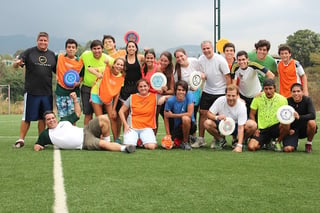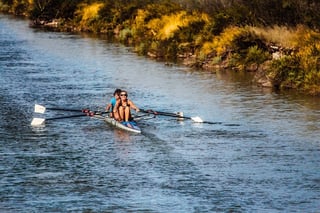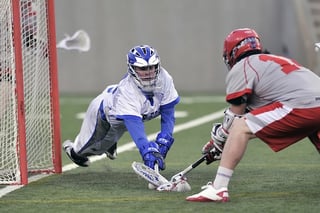
Are you an athlete? Thinking seriously about playing a sport in college? Or just love playing for fun? Consider attending a college-based summer sports camp! Get more playing time in and meet like-minded athletes with a passion for your sport. In this article, I’ll explain what college-based sports camps are, discuss the costs, give you some examples, and help you decide if you’d like to attend.
What Are College-Based Summer Sports Camps?
College-based summer sports camps are camps at which you play a specific sport. They're offered by colleges but are open to almost all ages from 5 years old through the end of high school. These camps vary in time length (from a few hours to several days long). Some camps are day camps (where you commute from home to attend the camp), but other camps are residential (where you live on campus at the camp location).
At these camps, you’ll likely be coached by one of the college’s team coaches. You’ll run drills, learn technique, and play against the other campers. These college-based camps all must operate according to NCAA rules.
All camps are open to anyone who’d like to attend. There are no requirements for entry other than that you’re in the age range for your camp of choice and can afford to pay the cost. I’ll discuss the costs later on.
Why are these college-based sports camps open to anyone who’d like to attend? It’s part of the NCAA rules. If schools want potential recruits to attend their sports camps, they also have to allow other students who are interested to be able to attend the camp. Additionally, NCAA rules don’t allow summer camps to provide scholarships on the basis of athletic ability. However, programs can offer scholarships based on financial need (I’ll discuss this more in the costs section).
What is the purpose of these camps for colleges? Most colleges run theses camps to attract top athletes to come to their college and play for their teams. While the camps are open to anyone, the reason colleges run them is to find young athletes and get them interested in attending their school. By introducing potential college athletes to the school coach and the team, colleges can get them excited about playing for that school. Also, it gives the coach a chance to help guide these young athletes to become better, more disciplined players while they’re still in high school. Other colleges (especially smaller schools or those who don't have outstanding teams) may just use these camps as a revenue source without giving players a ton of opportunities for recruitment.
What is the purpose of these camps for players? As a player, you should want to attend a sports camp to try to get the attention of college recruiters, to improve at a sport you love, or to do both.
What Sports Are Offered at College Sports Camps?
The sports offered at these camps range dramatically from traditional sports such as football or basketball to unique sports such as fencing. Here’s a list of all of the sports that I’ve seen offered at summer sports camps:
- Baseball
- Basketball
- Diving
- Fencing
- Field Hockey
- Football
- Ice Hockey
- Lacrosse
- Rowing
- Soccer
- Squash
- Strength and Conditioning
- Swimming
- Tennis
- Volleyball
- Water Polo
- Wrestling
NOTE: the sports offered will vary by college.
To locate a program for a sport you’re interested in, I recommend doing a Google search for “College [Sport Name] Summer Sports Camp” (such as College Fencing Summer Sports Camps), OR if you’re want to see if a sport is offered at a specific school, you can do a Google search for “[School Name] Summer Sports Camps” (such as Brown University Summer Sports Camps).

What Do You Do at College Sports Camps?
At these sports camps, you’re coached by either the actual Varsity head coach at that college or by one of the athletes or member of the athletic department. Again, this will vary by program, so you may want to conduct a Google search to find who will be coaching a specific sports camp.
At all of these camps, you spend time on training activities (for example, running drills) and time playing the sport. At certain camps, you’ll also spend time focusing on strategy. Some camps (such as UC Irvine’s soccer camp) bring in coaches from other colleges to watch you play and have workshops that talk to you about how to be recruited to play a sport and how to maintain academic eligibility. The exact itinerary varies by program.
Here’s what a daily itinerary might look like (from UC Irvine’s soccer camp):
- 7:30-8:30 AM BREAKFAST (Residents only)
- 8:30 AM COMMUTER DROP OFF
- 9:00-11:00 AM SESSION 1: Technical Drills
- 11:30 AM-12:30 PM: LUNCH (All campers)
- 12:30-2:00 PM: BREAK
- 2:30-4:30 PM: SESSION 2: Tactical Strategies
- 5:00-6:00 PM: DINNER (All campers)
- 6:30-8:00 PM: MATCH PLAY (playing in teams)
- 8:30-9:15 PM: COLLEGE RECRUITING 101 Seminar
- 9:30 PM: COMMUTER PICK UP
- 11:00 PM: LIGHTS OUT
Logistics: Costs, Financial Aid, and How to Apply
Prices can range from $100 to $1000. Price varies drastically by program and program length. A one-day or half-day commuter program will be less expensive (around $100-$200), while 5-day long residential camps will be more expensive (around $800-$1000). Again, do a Google search to locate a specific program, and the cost should be listed on that program website.
These prices are low compared to other summer camps, and I think there are a few reasons:
- These camps generally don’t offer “extracurricular” activities (such as trips to local museums or sporting events).
- These camps likely cost less to run since they’re using readily available facilities (the facilities they already use for their sports team). Also, these camps don’t need to hire their camp staff, since their staff is simply the team coach (the coach’s salary likely includes pay for the camp).
- These camps also probably keep costs low to allow many people to attend.
- Colleges may subsidize their camps (or run them at zero profit, i.e. charge only what it costs them) in order to attract top athletes from all socioeconomic conditions.

Is Financial Aid Available?
As I briefly mentioned before, NCAA rules prohibit college sports summer camps from providing scholarships on the basis of athletic ability. However, some summer sports programs can offer scholarships based on financial need. This varies by college and program. Look up a specific program through Google to see their financial aid availability.
Traditionally, only high school students who qualify for federal financial aid programs (such as free or reduced lunch) qualify for financial aid. However, check with the specific program to be sure.
Furthermore, due to NCAA rules, no third party can pay for your sports camp fee. For example, a family friend can’t pay for your summer camp fee. The fees must be paid by your legal guardian. This is a precaution set up by the NCAA to avoid having alumni secretly pay the fee for you to attend the summer camp as a way of trying to persuade you to attend that college and play that sport there in the future.
How to Apply to a College Summer Sports Camp
According to NCAA regulations (for college programs), there can be no requirements to attend the program other than meeting the age qualification and paying the fee to attend. However, sign up early because programs often have a limit on the number of students that can attend the camp. Sign up through the program website.
Again, you can find a specific program through a simple Google search for “College [Sport Name] Summer Sports Camp” (such as College Fencing Summer Sports Camps) or “[School Name] Summer Sports Camps” (such as Brown University Summer Sports Camps).
Program Examples
Colleges across the country offer summer sports camps. You can attend this type of camp at Division I colleges (such as UC Irvine, Brown, and Princeton), Division II colleges (such as Palm Beach Atlantic University), and Division III colleges (such as Johns Hopkins University).
Search for a specific school through Google by typing in “[School Name] Summer Sports Camp” (such as Yale University Summer Sports Camp) to see if they offer a sports camp.
What Are the Benefits of Attending a College Sports Camp?
If you’re hoping to play a college sport and decide to attend a college summer sports camp, this is a great way to get in front of a coach at a school you’re interested in playing for. It also gives you a chance to try out the school to see if you like the school and the coach. Additionally, it gives you a chance to play the sport with a different coach and teammates than usual, which will make you a more flexible and better player.
If you’re not hoping to play a college sport and decide to attend a college summer sports camp, it’s still a great opportunity! You’ll get to try out a college you’re interested in while making friends and getting great exercise. Additionally, lots of colleges say they like to see you showed a real interest in their school. Well, participating at a sports camp at their college shows you’re really serious about attending their school!
How to Choose a Camp If You're Trying to Get Recruited
If your goal for attending a summer sports camp is to get recruited, you need to do a lot of research before choosing a camp. Once you've identified a few camps you'd like to attend (using the method mentioned above), I have four research tips:
Tip #1: Figure out who does the actual coaching at the camp! Call the summer sports camp you're interested in to ask who the coach is. If you're going to spend your time and money on a program, you want to make sure you're being coached by the head coach (or, at least, high-ranking members of the coaching staff).
Tip #2: Find out how many other kids will attend the camp. When you call the office, make sure you find out how many campers will be there. You want to find a camp with a small camper to coach ratio. Some camps have 100 or more campers at each session; others only have 20. Try to look for the smaller programs where you'll have more face time with the coach.
Tip #3: Find out how old your fellow campers will be. You should be able to find this on the summer sports camp website, but if not call the office to ask. You want to attend a summer sports camp that is exclusively for high school athletes. You do NOT want to attend a camp open to all ages; otherwise, coaches may be busy babysitting younger players and may not pay close attention to you.
Tip #4: Ask if any of the college's current players attended the camp. Obviously, schools that have players who attended the camp are more likely to recruit you from their camp! Be wary of colleges where none of the players attended the camp.

Alternatives to College-Based Summer Sports Camps
In this article, I focused on college-based sports camps, but you should know that there are also private and local parks & recreation department sports camps to attend if you decide that a college-based sports camp isn’t for you.
Private sports camps are organized by private companies such as Nike or simply by individuals (in my hometown, a former MLB baseball player had started a private summer baseball camp). At these private sports camps, you’ll also run drills and play the sport. However, you likely won’t be coached by a college coach (though some of these camps do hire college coaches). You’ll more likely be coached by a former professional athlete, former high school athlete, or high school coach. These camps vary in time and price.
Some of these camps are a single day while some are multiple week residential or non-residential programs. The residential (sleepaway camp style) programs are typically based at a university (although they're run by a private organization). The schedule is usually identical to a daily commuter sports camp; however, overnight campers are provided all meals, housing, and usually have the opportunity to play more (since they can play after dinner). Find a private summer sports camp in your area by conducting a Google Search for “[Town Name] summer sports camp.”
In addition to college-based and private summer sports camps, most parks departments offer summer sports programs. These programs are essentially the same as private sports camps (except they don’t offer residential options). Look at your local parks department website to see what sports camps are offered in your area. Locate your local parks department website by searching Google for “[Town Name] parks & recreation department.”
No matter who hosts it, attending a summer sports camp is a great experience. You’ll get to have a lot of fun, make friends, exercise, and play a sport you love!
What’s Next?
If you’re interested in a summer program for high school students, you should check out the Emory Pre-College Program and the Boston University Summer Challenge.
If you’re interested in playing a sport in college, you should learn about the different sports levels. Check out our complete list of NCAA Division 1 colleges, the complete list of NCAA Division 2 colleges, and complete list of NCAA Division 3 colleges.
Want to improve your SAT score by 160 points or your ACT score by 4 points? We've written a guide for each test about the top 5 strategies you must be using to have a shot at improving your score. Download it for free now:
Have friends who also need help with test prep? Share this article!

As an SAT/ACT tutor, Dora has guided many students to test prep success. She loves watching students succeed and is committed to helping you get there. Dora received a full-tuition merit based scholarship to University of Southern California. She graduated magna cum laude and scored in the 99th percentile on the ACT. She is also passionate about acting, writing, and photography.



































 Holly R.
Holly R.